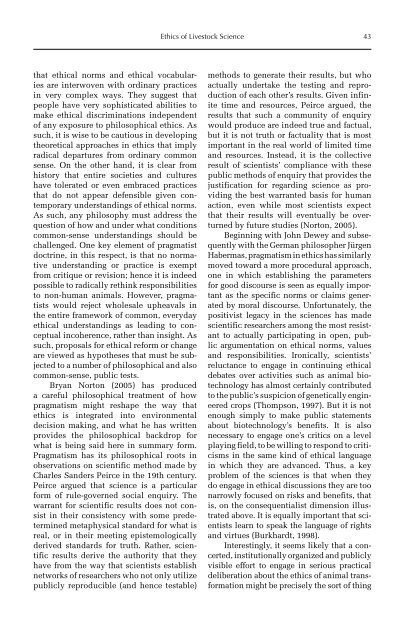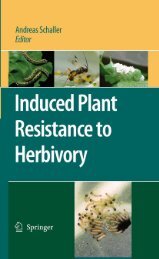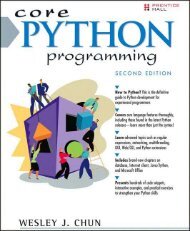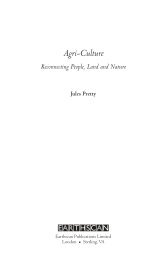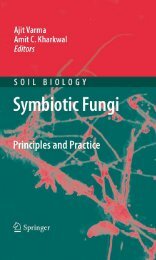Redesigning Animal Agriculture
Redesigning Animal Agriculture
Redesigning Animal Agriculture
Create successful ePaper yourself
Turn your PDF publications into a flip-book with our unique Google optimized e-Paper software.
that ethical norms and ethical vocabularies<br />
are interwoven with ordinary practices<br />
in very complex ways. They suggest that<br />
people have very sophisticated abilities to<br />
make ethical discriminations independent<br />
of any exposure to philosophical ethics. As<br />
such, it is wise to be cautious in developing<br />
theoretical approaches in ethics that imply<br />
radical departures from ordinary common<br />
sense. On the other hand, it is clear from<br />
history that entire societies and cultures<br />
have tolerated or even embraced practices<br />
that do not appear defensible given contemporary<br />
understandings of ethical norms.<br />
As such, any philosophy must address the<br />
question of how and under what conditions<br />
common-sense understandings should be<br />
challenged. One key element of pragmatist<br />
doctrine, in this respect, is that no normative<br />
understanding or practice is exempt<br />
from critique or revision; hence it is indeed<br />
possible to radically rethink responsibilities<br />
to non-human animals. However, pragmatists<br />
would reject wholesale upheavals in<br />
the entire framework of common, everyday<br />
ethical understandings as leading to conceptual<br />
incoherence, rather than insight. As<br />
such, proposals for ethical reform or change<br />
are viewed as hypotheses that must be subjected<br />
to a number of philosophical and also<br />
common-sense, public tests.<br />
Bryan Norton (2005) has produced<br />
a careful philosophical treatment of how<br />
pragmatism might reshape the way that<br />
ethics is integrated into environmental<br />
decision making, and what he has written<br />
provides the philosophical backdrop for<br />
what is being said here in summary form.<br />
Pragmatism has its philosophical roots in<br />
observations on scientific method made by<br />
Charles Sanders Peirce in the 19th century.<br />
Peirce argued that science is a particular<br />
form of rule-governed social enquiry. The<br />
warrant for scientific results does not consist<br />
in their consistency with some predetermined<br />
metaphysical standard for what is<br />
real, or in their meeting epistemologically<br />
derived standards for truth. Rather, scientific<br />
results derive the authority that they<br />
have from the way that scientists establish<br />
networks of researchers who not only utilize<br />
publicly reproducible (and hence testable)<br />
Ethics of Livestock Science 43<br />
methods to generate their results, but who<br />
actually undertake the testing and reproduction<br />
of each other’s results. Given infinite<br />
time and resources, Peirce argued, the<br />
results that such a community of enquiry<br />
would produce are indeed true and factual,<br />
but it is not truth or factuality that is most<br />
important in the real world of limited time<br />
and resources. Instead, it is the collective<br />
result of scientists’ compliance with these<br />
public methods of enquiry that provides the<br />
justification for regarding science as providing<br />
the best warranted basis for human<br />
action, even while most scientists expect<br />
that their results will eventually be overturned<br />
by future studies (Norton, 2005).<br />
Beginning with John Dewey and subsequently<br />
with the German philosopher Jürgen<br />
Habermas, pragmatism in ethics has similarly<br />
moved toward a more procedural approach,<br />
one in which establishing the parameters<br />
for good discourse is seen as equally important<br />
as the specific norms or claims generated<br />
by moral discourse. Unfortunately, the<br />
positivist legacy in the sciences has made<br />
scientific researchers among the most resistant<br />
to actually participating in open, public<br />
argumentation on ethical norms, values<br />
and responsibilities. Ironically, scientists’<br />
reluctance to engage in continuing ethical<br />
debates over activities such as animal biotechnology<br />
has almost certainly contributed<br />
to the public’s suspicion of genetically engineered<br />
crops (Thompson, 1997). But it is not<br />
enough simply to make public statements<br />
about biotechnology’s benefits. It is also<br />
necessary to engage one’s critics on a level<br />
playing field, to be willing to respond to criticisms<br />
in the same kind of ethical language<br />
in which they are advanced. Thus, a key<br />
problem of the sciences is that when they<br />
do engage in ethical discussions they are too<br />
narrowly focused on risks and benefits, that<br />
is, on the consequentialist dimension illustrated<br />
above. It is equally important that scientists<br />
learn to speak the language of rights<br />
and virtues (Burkhardt, 1998).<br />
Interestingly, it seems likely that a concerted,<br />
institutionally organized and publicly<br />
visible effort to engage in serious practical<br />
deliberation about the ethics of animal transformation<br />
might be precisely the sort of thing


